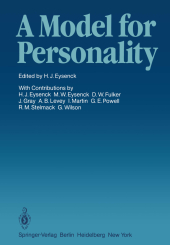 Neuerscheinungen 2011Stand: 2020-01-07 |
Schnellsuche
ISBN/Stichwort/Autor
|
Herderstraße 10
10625 Berlin
Tel.: 030 315 714 16
Fax 030 315 714 14
info@buchspektrum.de |

Hans J. Eysenck
A Model for Personality
Herausgegeben von Eysenck, H.J.
2011. xii, 287 S. XII, 287 pp. 75 figs., 40 tabs. 244 mm
Verlag/Jahr: SPRINGER, BERLIN 2011
ISBN: 3-642-67785-1 (3642677851)
Neue ISBN: 978-3-642-67785-4 (9783642677854)
Preis und Lieferzeit: Bitte klicken
With contributions by numerous experts
H. J. Eysenck This book is not an introduction to personality research, it is not a textbook, and above all it is not a model of personality. The title, A Modelfor Personality, was chosen on purpose to indicate that we are here concerned with a discussion of how models in this field ought to be constructed, what their functions were, and whether such models or paradigms could with advantage be produced at this stage of development. One particular aspect of personality, extraversion introversion (E), has been chosen to exemplify the desiderata which emerge from such a discussion. It is not suggested that personality and E are synonymous - merely that this particular dimension is perhaps better known than any other, has had more experimental work done on it than any other and has acquired a better theoretical substructure, and more links with genetics and physiology, than any other. Hence it seems most likely to serve as an example of how a satisfactory model of personality might ultimately be constructed, i. e. by analogy with E. Other dimensions of personality, such as neuroticism-stability or psycho tic ism-superego functioning, are mentioned in the discussion, but only when they overlap or interrelate with E. The book uses E as an example to illustrate the way in which a model of personality can be constructed, but it is in no way a summary of all that is known about E.
Hans J. Eysenck, geb. in Berlin, ist wohl der am meisten bekannte Psychologe des 20. Jahrhunderts mit rund 90 Büchern und fast 1000 Fachartikeln. Weltbekannt (und bis heute grundlegend) wurden seine Studien zur Persönlichkeitsforschung, die häufig zu Test- und Fragebogenverfahren eingesetzt werden. Der Autor war Direktor des Psychiatrischen Instituts der University of London. Er verstarb 1997.


